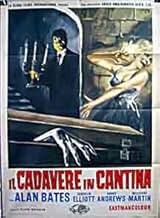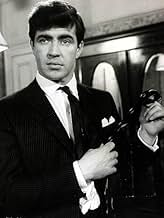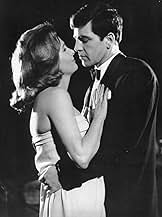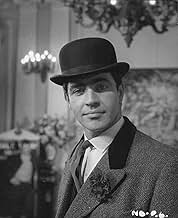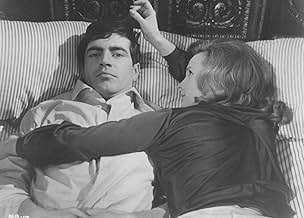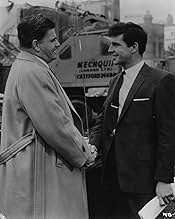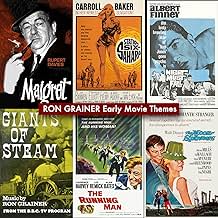IMDb-BEWERTUNG
6,5/10
560
IHRE BEWERTUNG
Füge eine Handlung in deiner Sprache hinzuA young and ambitious businessman hires an unemployed upper-class man to tutor him in the life skills which he thinks are necessary to succeed. When he succeeds, disaster threatens.A young and ambitious businessman hires an unemployed upper-class man to tutor him in the life skills which he thinks are necessary to succeed. When he succeeds, disaster threatens.A young and ambitious businessman hires an unemployed upper-class man to tutor him in the life skills which he thinks are necessary to succeed. When he succeeds, disaster threatens.
- Regie
- Drehbuch
- Hauptbesetzung
- Nominiert für 1 BAFTA Award
- 1 Gewinn & 3 Nominierungen insgesamt
Avice Landone
- Mrs. Horton
- (as Avice Landon)
Anneke Wills
- Girl
- (as Annika Wills)
Empfohlene Bewertungen
The year before he won an Oscar for "Darling", Frederic Raphael adapted Stanley Ellin's short story "Nothing But the Best" for the screen. It was a kind of comic "Room at the Top" directed by that fine and underrated director Clive Donner and photographed by none other than Nicolas Roeg. Alan Bates is the social climbing Jimmy Brewster who does marry the boss' daughter, (Millicent Martin, very good), on his way up the ladder but still has to indulge in a spot of murder as well.
It's got a terrific supporting cast that includes Denholm Elliot at his Machiavellian best as Bates' tutor in the art of social mobility, Harry Andrews as his boss and, best of all, Pauline Delaney as an over-sexed landlady. It all adds up to a delightfully sharp satire yet hardly anyone has seen it. Seek it out because, apart from anything else, it's also one of the great London films.
It's got a terrific supporting cast that includes Denholm Elliot at his Machiavellian best as Bates' tutor in the art of social mobility, Harry Andrews as his boss and, best of all, Pauline Delaney as an over-sexed landlady. It all adds up to a delightfully sharp satire yet hardly anyone has seen it. Seek it out because, apart from anything else, it's also one of the great London films.
A pretty superb black comedy with award winning screenplay by American born Frederick Raphael, distinguished screenwriter. A good story, great performances and excellent production. And, more than 50 years later, still fresh. Popular music, fashions, decor, language, behaviour -so much has changed in 50 years. But a lot remains unchanged: money and class to name but two.
Brewster (Alan Bates) is an exceptional young man. Of lower middle class background he can maintain a habitually pleasant expression, be charming and humorous, is very quick-witted, opportunistic, coldly calculating , completely unscrupulous and will do anything necessary to feed an almost unlimited ambition - without ever losing his habitual pleasant expression. Brewster is determined to climb the social ladder but the exclusive club of the upper class and very wealthy keeps its doors firmly shut to him and his like. However a happy chance meeting suggests a scheme to breach the club's defences. One of its members (Mr Prince - Denholm Elliot), thoroughly-disgraced son, disowned by his family, can be persuaded, for money, to train Brewster in the ways of his class: how to dress, how to speak, how to behave. And quick learner, Brewster turns out to be. But Brewster is no snob and is always practical: while it's his boss's daughter he plans to wed, he nevertheless finds it advantageous to retain a place in his middle-aged landlady's heart and bed.
But it is the screenplay which received the film's single award and the dialogue is at its smartest as Prince instructs imposter Brewster in the ways of the class he aspires to join. It's not just their opinions but the different manner with which each must be delivered. Faking an Oxbridge background, how to behave when watching college rowing (be ostentatiously disparaging as if an older and better rower). Suitable opinions (circa 1963) on foreigners: Americans - "let us down badly over Suez". Black people "make fine cricketers". The commandments seem to include: be brief, never bore, never be overly earnest, understate, don't be adventurous.
This is Frederick Raphaels satire and take on the British upper classes, that a clever fake can remain under all circumstances undetected. I think the evidence is that their antennae are especially finely tuned for the avoidance of just such unfortunate marriages. However history suggests that the titled owner of the grand London estate agents auctioneers (Harry Andrews) where Brewster works, prizes business acumen over actual social background. Over time, with good schooling for the next generation, social class can be retained. But without money neither a growing financial empire nor a dynasty is possible.
Some great moments as when Brewster's pleasant expression is tested to its limits when a familiar large case arrives at his shortly be in-laws grand house, and falls from a considerable height. Bates and Denholm Elliot are both superb. A great British film.
Until Talking Pictures TV came on the scene and revived some of these quality films, I would have never realised the cinema talent Britain had. So badly are we let down by the broadcasters
Brewster (Alan Bates) is an exceptional young man. Of lower middle class background he can maintain a habitually pleasant expression, be charming and humorous, is very quick-witted, opportunistic, coldly calculating , completely unscrupulous and will do anything necessary to feed an almost unlimited ambition - without ever losing his habitual pleasant expression. Brewster is determined to climb the social ladder but the exclusive club of the upper class and very wealthy keeps its doors firmly shut to him and his like. However a happy chance meeting suggests a scheme to breach the club's defences. One of its members (Mr Prince - Denholm Elliot), thoroughly-disgraced son, disowned by his family, can be persuaded, for money, to train Brewster in the ways of his class: how to dress, how to speak, how to behave. And quick learner, Brewster turns out to be. But Brewster is no snob and is always practical: while it's his boss's daughter he plans to wed, he nevertheless finds it advantageous to retain a place in his middle-aged landlady's heart and bed.
But it is the screenplay which received the film's single award and the dialogue is at its smartest as Prince instructs imposter Brewster in the ways of the class he aspires to join. It's not just their opinions but the different manner with which each must be delivered. Faking an Oxbridge background, how to behave when watching college rowing (be ostentatiously disparaging as if an older and better rower). Suitable opinions (circa 1963) on foreigners: Americans - "let us down badly over Suez". Black people "make fine cricketers". The commandments seem to include: be brief, never bore, never be overly earnest, understate, don't be adventurous.
This is Frederick Raphaels satire and take on the British upper classes, that a clever fake can remain under all circumstances undetected. I think the evidence is that their antennae are especially finely tuned for the avoidance of just such unfortunate marriages. However history suggests that the titled owner of the grand London estate agents auctioneers (Harry Andrews) where Brewster works, prizes business acumen over actual social background. Over time, with good schooling for the next generation, social class can be retained. But without money neither a growing financial empire nor a dynasty is possible.
Some great moments as when Brewster's pleasant expression is tested to its limits when a familiar large case arrives at his shortly be in-laws grand house, and falls from a considerable height. Bates and Denholm Elliot are both superb. A great British film.
Until Talking Pictures TV came on the scene and revived some of these quality films, I would have never realised the cinema talent Britain had. So badly are we let down by the broadcasters
I saw this film in 1964 when it was first released; and it is still the only film that I have sat through for two consecutive showings. I thought it was brilliant, sharp and very funny. Alan Bates, then a major international star, was at his very best: funny, cynical, cold, vicious, everything the role required. The supporting cast - led by Millicent Martin, Harry Andrews, Denholm Elliott - were also superb.
Jimmy Brewster (Bates) is, to use the derogatory upper-class term, "an ambitious yob", a working-class chap toiling anonymously at his desk in a large real-estate company and wanting better things, when one day he has an accidental encounter in a restaurant with Charlie Prince (Elliott), the disgraced son of Brewster's employer. As Charlie puts it, "One day a black cloud appeared in my office, and shortly after that I departed under it." Charlie is a worthless wastrel, but he has one skill: he can show Jimmy how to dress and talk properly and to be a "gentleman". The trade-off is that Jimmy will give Charlie a place to live and money for expenses. Charlie is a good teacher and Jimmy is a brilliant student, conning everyone in sight, slowly climbing the ladder to success. Then one day, Charlie asks Jimmy to lay a large bet for him - with Jimmy's money - on a horse, and the horse wins, at astronomical odds. Charlie is very much in the money again, and decides he doesn't need Jimmy any longer. But Jimmy turns the tables, does away with Charlie, and keeps the money for himself. And continues his climb up the corporate and social ladders, all the way to the top. Along the way he woos Charlie's sister, Ann (Millicent Martin), and marries her. In a memorable scene, while courting Ann, Jimmy takes her to massive country estate that is conveniently empty, pretending that it belongs to his family. Ann looks at the magnificent place, suitably impressed, smiles at Jimmy and delivers one of the best lines in the film: "Darling, how did you know my size?"
And then Charlie's body is found, and perhaps the ruthless, if charming, Jimmy is about to come a-cropper. Or perhaps not.
It's a brilliant film on all levels. The great tragedy is that it appears to be no longer available, on film or on video/DVD. If I could find the magic lamp, and be granted one filmic wish, "Nothing But The Best" would be in general distribution on DVD next week.
Jimmy Brewster (Bates) is, to use the derogatory upper-class term, "an ambitious yob", a working-class chap toiling anonymously at his desk in a large real-estate company and wanting better things, when one day he has an accidental encounter in a restaurant with Charlie Prince (Elliott), the disgraced son of Brewster's employer. As Charlie puts it, "One day a black cloud appeared in my office, and shortly after that I departed under it." Charlie is a worthless wastrel, but he has one skill: he can show Jimmy how to dress and talk properly and to be a "gentleman". The trade-off is that Jimmy will give Charlie a place to live and money for expenses. Charlie is a good teacher and Jimmy is a brilliant student, conning everyone in sight, slowly climbing the ladder to success. Then one day, Charlie asks Jimmy to lay a large bet for him - with Jimmy's money - on a horse, and the horse wins, at astronomical odds. Charlie is very much in the money again, and decides he doesn't need Jimmy any longer. But Jimmy turns the tables, does away with Charlie, and keeps the money for himself. And continues his climb up the corporate and social ladders, all the way to the top. Along the way he woos Charlie's sister, Ann (Millicent Martin), and marries her. In a memorable scene, while courting Ann, Jimmy takes her to massive country estate that is conveniently empty, pretending that it belongs to his family. Ann looks at the magnificent place, suitably impressed, smiles at Jimmy and delivers one of the best lines in the film: "Darling, how did you know my size?"
And then Charlie's body is found, and perhaps the ruthless, if charming, Jimmy is about to come a-cropper. Or perhaps not.
It's a brilliant film on all levels. The great tragedy is that it appears to be no longer available, on film or on video/DVD. If I could find the magic lamp, and be granted one filmic wish, "Nothing But The Best" would be in general distribution on DVD next week.
I haven't see this movie for years but remember loving it. It is devilishly clever and beautifully filmed, with a great cast, especially Alan Bates. I had forgotten the name of it and now that I have found it, I plan to buy it for my personal collection. Let's face it, you almost can't go wrong with a British comedy and this is one of the best.
Alan Bates is the scoundrel here who thinks he is about to get away with anything. Everything is wrong with him except his ambitions. In order to climb the social ladder to riches and success he not just uses any dirty tricks to get along on the way, but his knack is simply to follow the mainstream of general hypocrisy, consistent deceit by means of sticking to lies, outrageous audacity and the general euphemistic way of life ignoring all that is out of any private interest to you. Everything here is permanent dishonesty, and for its blatant shamelessness the film is actually shocking in its horrible satire of upper class business life, while you must admit that it is extremely well done, in perfect cleverness, wit and elegance. All the actors are perfect, and you don't even feel sorry for Denholm Elliott who actually did nothing to help himself except in digging his own grave, while Alan Bates' acting is a marvel of sticking to a masked role. Millicent Martin actually suits him, it is even suggested that she sees him through and appreciates his charade, and you are used to Denholm Elliott as the perfect loser. In brief, in spite of its revolting immorality, the film is thoroughly enjoyable for its virtuosity in cleverness and elegance.
Wusstest du schon
- WissenswertesOn the commentary track for Saint Jack (1979), director Peter Bogdanovich said he became a huge fan of Denholm Elliott after watching this film, which was before he became a director. He cast Elliott in an important co-starring role in Noises Off! - Der nackte Wahnsinn (1992), which was his last film.
- Crazy CreditsClosing credits epilogue: ? THE END IS A PHRASE WHICH USUALLY CLOSES OTHER PEOPLES STORIES: IT NEVER APPLIES TO ONES OWN
- SoundtracksTitle Song
(Nothing But The Best)
Sung by Millicent Martin
To Music by Ron Grainer and Lyrics by Frederic Raphael
Top-Auswahl
Melde dich zum Bewerten an und greife auf die Watchlist für personalisierte Empfehlungen zu.
- How long is Nothing But the Best?Powered by Alexa
Details
- Laufzeit1 Stunde 39 Minuten
- Seitenverhältnis
- 1.66 : 1
Zu dieser Seite beitragen
Bearbeitung vorschlagen oder fehlenden Inhalt hinzufügen

Oberste Lücke
By what name was Man geht wieder über Leichen (1964) officially released in India in English?
Antwort
